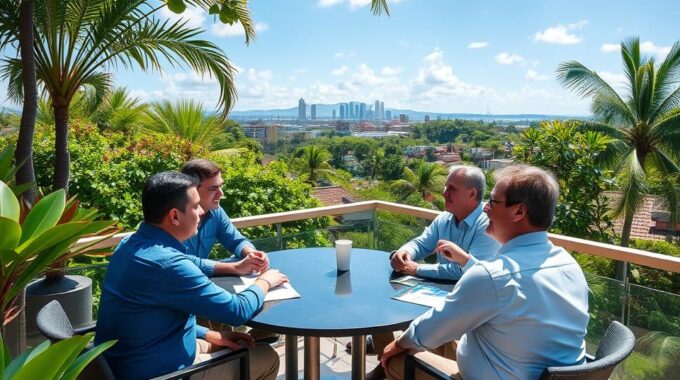Simplify your Costa Rica Home Equity Loan Process with our step-by-step guide. Get fast access to funds with competitive rates and flexible terms.

Navigating Mortgages for Foreigners in Costa Rica with GAP Equity Loans
Ever thought about buying a home in Costa Rica without spending too much? The real estate here is full of chances, but getting a mortgage can seem tough. Luckily, GAP Equity Loans make it easier to finance your dream home.
As an expat, I’ve found that using property equity is key. It helps me get the funds I need and fits my financial situation. With GAP Equity Loans, you can get a mortgage with rates starting at 12% and terms from six months to three years. This makes it easier to find the right financing for your needs.
Key Takeaways
- Understanding the Costa Rican real estate market is vital for foreign investors.
- GAP Equity Loans offer flexible terms, quick approvals, and competitive rates.
- Foreign buyers typically face higher down payment requirements of 35-50%.
- Private lenders may provide financing up to 70% of the property’s value.
- Comparing different loan options is essential to find the best loan for me in Costa Rica.
Understanding the Costa Rican Real Estate Market
The Costa Rica real estate market has seen big changes lately. These changes affect property values and investment chances. It’s key to understand these shifts, especially for those looking to invest in Costa Rica.
A closer look shows a market in constant change. This change is driven by shifting demands and pricing factors. These are important for potential buyers to consider.
Overview of Market Trends
Property values in Costa Rica have been going up, with a 7% annual increase on average. This growth is seen most in areas like Guanacaste and the Central Valley. These places attract a lot of foreign investment, showing their appeal.
In 2020, international investments hit $1.76 billion. This shows a strong interest in the local market.
Demand Dynamics and Pricing Factors
It’s important to understand what drives demand in the Costa Rica real estate market. The country’s economic stability, tourist demand, and low inflation rates make it attractive to foreign buyers. Coastal areas and popular tourist spots have higher property prices, making location a big factor.
Foreign property owners in Costa Rica have the same rights as citizens. This makes buying and owning property easier. For those looking to build, avoiding costly renovations can be a smart move.
Challenges of Securing Financing in Costa Rica
Getting a mortgage in Costa Rica can be tough for foreign buyers. The mortgage options are shaped by many factors. These include big down payments and different ways to finance. Knowing these challenges is key for anyone wanting to buy property in Costa Rica.
Down Payment Requirements for Foreign Buyers
Foreign buyers often need to pay 30% to 50% down at private banks. This is a big challenge, especially since most banks stick to this range. Private lenders might offer up to 70% financing, but it’s still a big financial step.
Using seller financing can help, with a minimum down payment of 50%. This option gives some flexibility
Common Language Barriers in the Mortgage Process
Language can be a big problem in getting a mortgage. Many foreign buyers struggle because they don’t speak Spanish well. This can cause misunderstandings about mortgage rules and make dealing with local banks hard.
It’s important for investors to work with agents or consultants who speak both languages. They can help make the financing process smoother in Costa Rica.
Mortgage for Foreigners in Costa Rica
Getting a mortgage in Costa Rica can be tricky for foreign buyers. It’s important to know the different mortgage options. This helps in making smart choices. There are various loans available, from traditional banks to private lenders and seller financing.
Types of Mortgages Available
Foreign buyers have many mortgage options in Costa Rica:
- Traditional Mortgages: Banks like Banco Lafise, Bac San Jose, and BCT offer these. They need a down payment of 30% to 50% and can last up to 20 years. The interest rates are between 8.5% and 10%.
- Private Loans: Private lenders have more flexible terms. They finance up to 70% of the property value with rates from 8% to 16%. These loans are often approved in 30 days or less.
- Owner Financing: This option requires a 50% down payment and has lower interest rates, from 6% to 9%. It’s a good choice for those who want to deal directly with sellers.
Eligibility Criteria for Foreign Buyers
Foreign buyers need to meet certain criteria for mortgages:
- Having a stable income is key to getting a loan, showing financial stability.
- Documentation like proof of income and residency status may be needed. This depends on the loan type.
- Loan approval times can vary from a few months to six months.
Exploring GAP Equity Loans
GAP Equity Loans is a great option for financing in Costa Rica. It lets you use your property to get a loan. This can be for a home or business, offering many loan choices.
Using Property as Collateral
Using your property as collateral has many benefits. It makes getting a loan easier and faster. You don’t need as much paperwork as with regular bank loans.
Loan Amounts and Interest Rates
GAP Equity Loans offers loans from $50,000 to $3 million. The interest rates in Costa Rica are competitive, from 12% to 16%. This makes it a good choice for growing your finances. For more information, visit this resource.
Flexible Repayment Terms
GAP Equity Loans is known for its flexible repayment plans. You can choose from 6 months to 3 years. This flexibility helps you find a plan that fits your financial situation and goals.
Whether you need a quick solution or more time, there’s an option for you. The process is fast, often taking just 7 to 10 business days.
Comparing Traditional Mortgages and GAP Equity Loans
It’s important to know the different loan options in Costa Rica. Traditional mortgages and GAP Equity Loans have their own benefits and drawbacks. Looking at approval times and needed documents helps find the right loan for you.
Approval Timelines and Documentation
Traditional mortgages take a long time to get approved, sometimes up to a year. This is because banks need lots of paperwork, like proof of income and credit scores. On the other hand, GAP Equity Loans are much faster, getting approved in just 7 to 10 business days.
GAP Equity Loans are great for those who need money quickly. They can make decisions in as little as 24 hours. This makes them a popular choice for investors.
Long-Term vs. Short-Term Financing Needs
Choosing between traditional mortgages and GAP Equity Loans depends on your needs. Traditional mortgages are good for long-term plans, offering lower interest rates over time. But, if you need money fast for things like home improvements or starting a business, GAP Equity Loans are better.
GAP Equity Loans offer funding starting at $50,000. This flexibility is perfect for short-term financial needs. It lets you quickly change your financial plans if needed.
Strategies for Securing Financing as a Foreign Investor
Getting financing as a foreign investor in Costa Rica needs smart strategies. Working with experts who know the local market helps a lot. Expat mortgage brokers give great advice and help you find the best loan options in Costa Rica.
Working with Expat Mortgage Brokers
It’s key to work with expat mortgage brokers. They know more than just interest rates. They help understand local banking rules and terms, making it easier to find financing in Costa Rica.
Researching and Comparing Loan Options
Doing deep research is crucial for the best financing deal. Look at interest rates, loan amounts, and terms. Remember, closing costs are about 8% of the loan. I’ll compare offers to find the best fit for my finances.
For more info, check out secured loan options in Costa Rica. Interest rates vary from 12% to 18% per year. Each lender has its own rules for foreign investors, so it’s important to look at all options carefully.
The Mortgage Application Process
Getting a mortgage in Costa Rica is key for non-residents. Knowing the steps and needed documents is vital. A good application can help get approved faster.
Key Financial Documents Required
At the start, I need to collect certain financial documents. These include:
- Proof of income, like bank statements and tax returns.
- Identification forms, which may need multiple types.
- Property appraisals, to check the property’s value.
- Evidence of property insurance, for the lender’s protection.
These documents are crucial to show I can repay the loan. They make the application smoother.
Steps to Complete Your Application
Completing a mortgage application has clear steps. First, I gather all needed documents. Then, I fill out a loan request form with property and financial details.
After submitting, a property appraisal is done. This checks the home’s value. Finally, we discuss the loan agreement, where I can negotiate terms.
For those looking at home equity loans or commercial loans, knowing the financial landscape is key. Tailoring my application to Costa Rica’s mortgage process can lead to better financing.
Conclusion
Getting a mortgage in Costa Rica can be tough but also rewarding. It’s key to know the different financing options available. GAP Equity Loans, for example, offer flexible terms and quick approval, helping investors succeed.
Understanding the local market is vital. You’ll need to provide detailed documents and might have to pay more upfront. Getting help from experts can make finding the right mortgage easier, boosting your chances of buying property in Costa Rica.
Choosing the right financing path is crucial. Doing your homework, comparing rates, and looking at private options can greatly affect your investment. For more information, check out GAP Investments and GAP Equity Loans for guidance on the mortgage process.
Source Links
- https://crie.cr/financing-property-in-costa-rica-expert-guide-with-gap-equity-loans/
- https://www.gapequityloans.com/en/flexible-home-loans-in-costa-rica/
- https://www.gapequityloans.com/en/mortgage-deals-costa-rica/
- https://cicsacr.com/buying-property-in-costa-rica-prices/
- https://costahomesconnect.com/buying-property-in-costa-rica/
- https://osatropicalproperties.com/blog/real-estate-financing-in-costa-rica-can-you-get-a-mortgage-for-a-home-in-costa-rica
- https://gapinvestments.com/en/about-down-payments-in-costa-rica/
- https://www.costarica-realestate.com/property-financing-costa-rica
- https://www.remax-oceansurf-cr.com/financing-for-foreigners-in-costa-rica
- https://cbpacificrealty.com/article/foreigner-mortgage-guide-your-fast-track-to-costa-rican-property-ownership
- https://crlaw.info/info/real-estate/mortgages/non-resident-financing/
- https://www.gapequityloans.com/en/understanding-financing-for-foreigners-in-costa-rica/
- https://www.gapequityloans.com/en/is-it-hard-for-expats-to-get-a-mortgage-in-costa-rica/
- https://gap.cr/costa-rica-equity-loan-investment-opportunities-with-gap-investments/
- https://gapinvestments.com/en/real-estate-financing-options-for-investors/
- https://gapinvestments.com/en/a-guide-to-lenders-for-gap-investments-in-costa-rica/
- https://gapinvestments.com/en/financing-for-foreigners-in-costa-rica/
- https://gapinvestments.com/en/how-does-investment-property-financing-work-in-costa-rica/
- https://www.specialplacesofcostarica.com/blog/how-to-get-a-mortgage-in-costa-rica/
- https://kalmaplayanegra.com/can-an-american-get-a-mortgage-in-costa-rica/
- https://crie.cr/mortgages-in-costa-rica/
- https://flamingobeachrealty.com/can-a-foreigner-finance-real-estate-in-costa-rica/
- https://www.tresamigos-cr.com/financing-property-costa-rica
Article by Glenn Tellier (Founder of CRIE and Grupo Gap)



